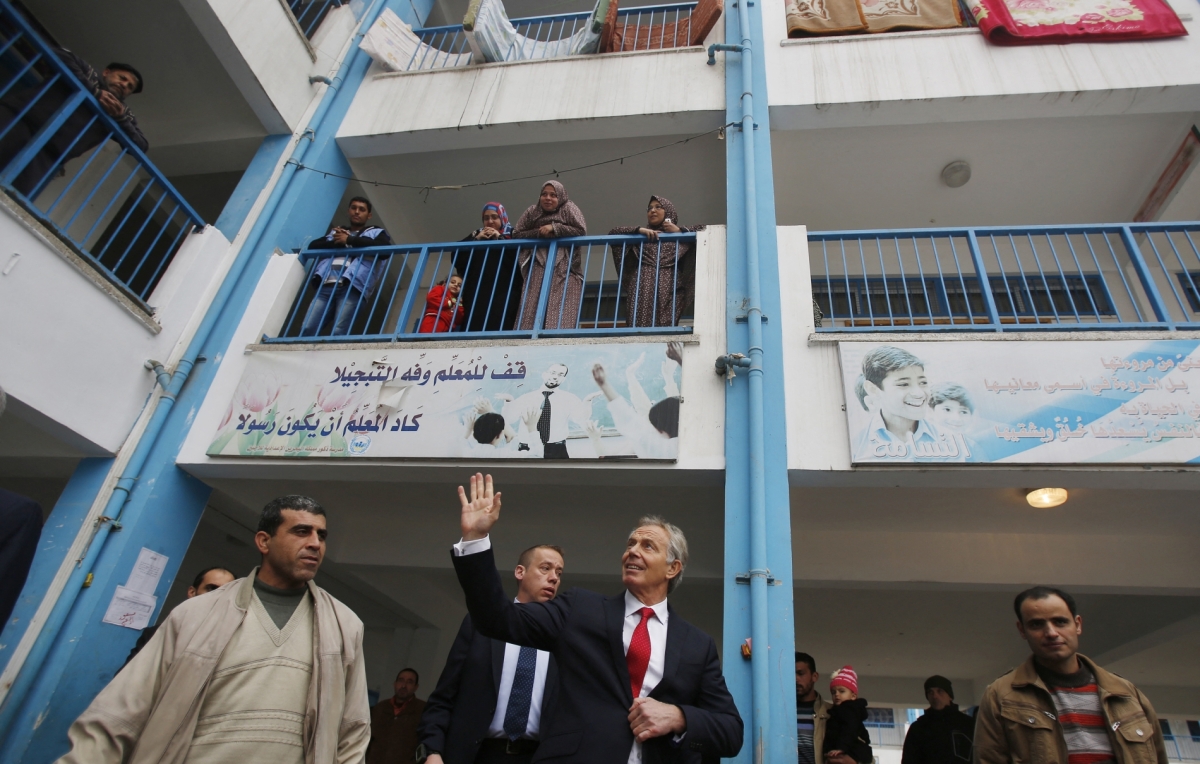Donald Trump met with former British Prime Minister Tony Blair and his son-in-law, Jared Kushner, at the White House on 27 August. The declared purpose of the meeting was to discuss Gaza. White House officials told Reuters the participants looked at all aspects of the Gaza issue, including escalating food aid deliveries and the hostage crisis. More abstractly, they broached the issue of what is to become of the territory after the war.
The Times of Israel reported (3 September) that Blair— who has been arranging a postwar Gaza plan for several months—told Trump during the meeting that Palestinians in Gaza “were desperate for new leadership and dreamt of becoming the next Dubai.” The newspaper did not cite its sources. For obvious reasons, the meeting was conducted behind closed doors.
The Financial Times also reported, back in July, that staff at Blair’s foundation—the Tony Blair Institute—had taken part in a project led by the Boston Consulting Group, which envisaged plans to remake Gaza into a regional trading hub after the war.
Blair has been advocating the idea of developing Gaza since as early as 2006, but without advocating for the removal of the Palestinians. It’s not surprising, therefore, that the Tony Blair Institute insists that its staff have never authored, developed or endorsed any proposal that would involve relocating Gaza’s residents.

It is surprising, on the other hand, that the Boston Consulting Group has also been keen to dissociate itself from plans to depopulate the strip. This is the same group, after all, who were behind the setting up of the Gaza Humanitarian Foundation (GHF), which has been killing hungry Palestinians in their hundreds as they queue at its aid hubs. In June, the Consulting Group terminated its contract with the GHF. On 10 July, the CEO, Christoph Schweizer, wrote to the Financial Times denying that his organisation had modelled a plan to ‘relocate’ Palestinians from Gaza and received millions for the service:
‘None of that is true. To be clear, a few people from BCG were involved in such work. They never should have been. The lead partner was explicitly told not to do any work related to Gaza reconstruction. The project fell well outside our standards for work that we accept. But the ban was ignored, and the work was secretively conducted anyway. An investigation that we launched in May of this year revealed a pattern of non-compliance by the two partners involved in this work, and they were exited from our firm.’
'Trump Gaza'
The US president has not been so circumspect in distancing himself from such plans. Back in February, he used an AI-generated video to introduce the world to the idea of a Riviera in the Middle East, crudely named 'Trump Gaza'—complete with skyscrapers and a vast statue of himself in gold.
“It’s been an unlucky place for a long time,” he mused. “Being in its presence just has not been good, and it should not go through a process of rebuilding and occupation by the same people that have really stood there and fought for it and lived there and died there and lived a miserable existence there.”
In garbled form, this might well have implied that the present population would be excluded from any clean-up operation that would follow hostilities. In short, they would already have been cleansed.
Trump added, “Everybody I've spoken to loves the idea of the United States owning that piece of land, developing and creating thousands of jobs with something that will be magnificent—in a really magnificent area.”
These were the words of an instinctive real estate man. Haaretz called the whole idea “a Trumpian get-rich-quick scheme reliant on war crimes, AI and tourism”.
Donald Trump’s son-in-law, Jared Kushner, is also familiar with the real estate business. He is also said to be on good terms with Blair. He shares the former prime minister’s anodyne tone. When interviewed in a forum at the Harvard Kennedy School, Kushner referred to the valuable potential of Gaza's “waterfront property,” and suggested that Israel should move civilians from Gaza to the Negev desert in southern Israel, bulldozing the area first, in order that the strip could be developed.
Read more: Far from spontaneous, Trump’s plan for Gaza has been plotted
The third real estate figure behind the enthusiastic talk of a Gulf-style Gaza is Trump’s old golfing buddy, now Middle East envoy, Steve Witkoff, who said the US was putting together a “very comprehensive” plan for “the next day” after the war. In an interview with Fox News, he said he believed the war in Gaza could be ended in the next four months. “We’re going to settle this one way or another, certainly before the end of this year.”
'Voluntary migration'
So, what is the current thinking of the real estate triumvirate? The Independent (2 September 2025) reported that the plan for the post-war redevelopment of Gaza would see the region’s Palestinian population paid $5,000 to leave ‘voluntarily.’
The Gaza Reconstitution, Economic Acceleration and Transformation Trust, otherwise known as the Great Trust, proposes that the 2 million Palestinians currently living in Gaza could be paid to relocate to other countries or secure zones as part of a deal that would also see them receive subsidies to cover four years of rent and a year’s worth of food.
With the current population gone, the US-administered trust then proposes to clear away the rubble and erect six to eight “dynamic, modern and AI-powered smart planned cities,” boasting multi-storey glass apartment complexes, public parks, “world-class resorts” along its Mediterranean beachfront, plus electric vehicle plants and data centres. Oh, and golf courses.
The venture would be undertaken without US government funding and instead be paid for by joint public and private sector investments, with Israel maintaining its “overarching rights to meet its security needs” in relation to Gaza and internal policing carried out by third-country nationals and “Western” private military contractors until ‘local’ police are trained up and ready to take over the responsibility.
The Guardian was highly critical of all this, verging on derisive: "The highly fanciful prospectus – subtitled “From a Demolished Iranian Proxy to a Prosperous Abrahamic Ally”– appears to have been drawn up by people with no physical knowledge of Gaza, the politics of the Middle East or the likely challenges in attempting to rebuild the territory as a multibillion-dollar tourism and technology hub that would inevitably compete with Israel."
Read more: Israel’s ‘voluntary’ migration policy in Gaza is anything but
















